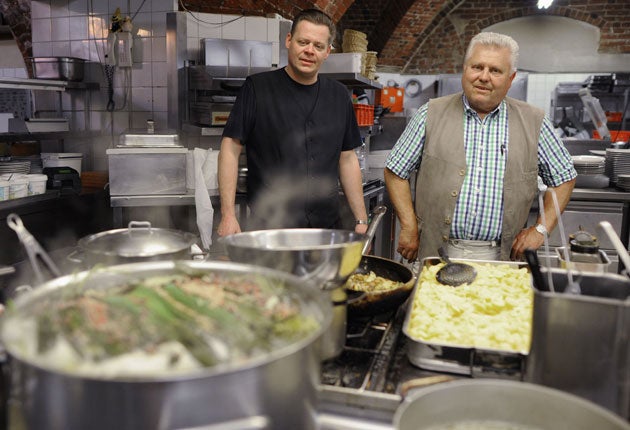Officials investigate restaurant where 18 E.coli victims dined
A party of tax officials and a group of Danish tourists fell ill after eating there; one has died

The search for clues to the source of the E.coli outbreak which has killed 19 Europeans and infected more than 1,700 worldwide was concentrated yesterday on a restaurant in the northern German town of Lübeck.
Some 18 people, including Danish tourists and a party of tax officials, fell ill after eating there. One has since died, and two others are in a critical condition.
It is not thought the eatery is directly to blame for any contamination, but, according to Werner Solbach, a microbiologist at the University Medical Centre Schleswig-Holstein: "The supply chain could give us important clues about how the pathogen was passed along."
If it is possible to track down where the restaurant obtained its salad, fruit and vegetables, then the source of the mutant E.coli bacteria might be found. This has so far eluded health officials. Efforts to identify the source of the outbreak have been complicated by the fact that salads include a variety of ingredients from different producers and, often, different countries.
Joachim Berger, proprietor of the Kartoffel-Keller (Potato Cellar) said last night he was devastated to hear that many of his guests had been struck down by the virulent bacteria. "It was like a blow to the head when I heard the news," he said. "We had everyone here tested and everything was disinfected. I paid for the tests myself because safety is important for our guests and employees."
But the Lübecker Nachrichten newspaper reported that scientists had identified the restaurant as a possible spot where the bug was passed on.
The German tax officials who fell ill after eating there belonged to a group of 34 female officials who were attending a trade-union seminar in the port city of Lübeck from 12 to 14 May. At least eight of them became infected with the E.coli bacteria after eating a meal on 13 May in the Kartoffel-Keller, which specialises in potato dishes. Many of those infected have developed haemolytic-uraemic syndrome (HUS), a potentially deadly complication that affects the kidneys. One of the women who contracted HUS died last Monday. The condition of two of the women is critical and a third needs daily kidney dialysis.
The group has been questioned extensively by investigators from Germany's Robert Koch Institute, which is trying to trace the pathogen. The women are reported to have told the Robert Koch team that they ate mostly salad – cucumbers and tomatoes. Hence, German official health warnings against eating such vegetables.
Mr Berger told Reuters: "We had a group of women here from the tax authorities and they ate à la carte. They enjoyed their meal. But the group was in town for quite a few days and also ate elsewhere. None of our employees is sick. No diarrhoea. And they all eat salad and everything we have here."
Mr Berger said his main food supplier was based in the city of Mölln, which is between Hamburg and Lübeck. He said his restaurant was "booked out – thank God", when the IoS spoke to him yesterday evening.
While Germany is at the centre of the outbreak, people have become ill in 10 other European countries and the United States, probably from eating lettuce, tomatoes, cucumbers or other raw salad vegetables in Germany. Other places where people have fallen ill include Austria, the Czech Republic, Denmark, France, the Netherlands, Norway, Spain, Sweden and Switzerland.
Britain has 11 cases, all of whom are German or have recently visited that country. The food contamination is believed to have been caused by poor hygiene at a farm, in transit, or at a shop or food outlet.
The National Farmers Union warned that vegetable producers could see prices slump as salad produce went unwanted on the Continent and flooded the UK market. The NFU has held talks with supermarkets to ensure they pay British farmers "a price that reflects the quality of the product". Morrisons said it did not import any salad vegetables from Germany, while Tesco said it imports only cauliflower from the country. Waitrose said the majority of its vegetables are home-grown, so are not affected.
E.coli normally lives harmlessly in our gut, but this strain has the ability to stick to intestinal walls where it pumps out toxins, sometimes causing severe bloody diarrhoea and kidney problems. Many patients have needed intensive care, including dialysis due to the kidney complications. The World Health Organisation said the strain was rare, had been seen in humans before but never in this kind of outbreak.
Join our commenting forum
Join thought-provoking conversations, follow other Independent readers and see their replies
Comments